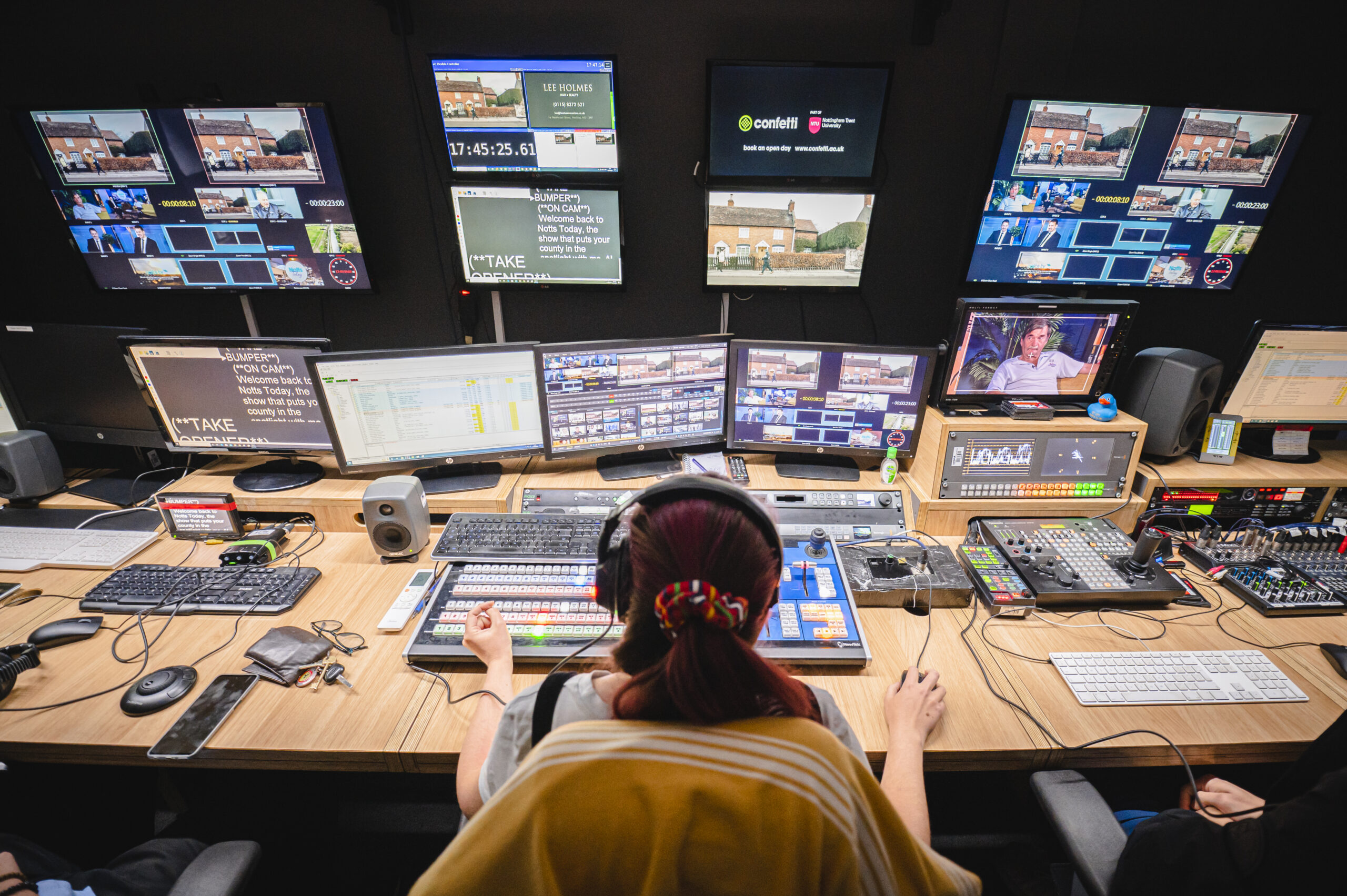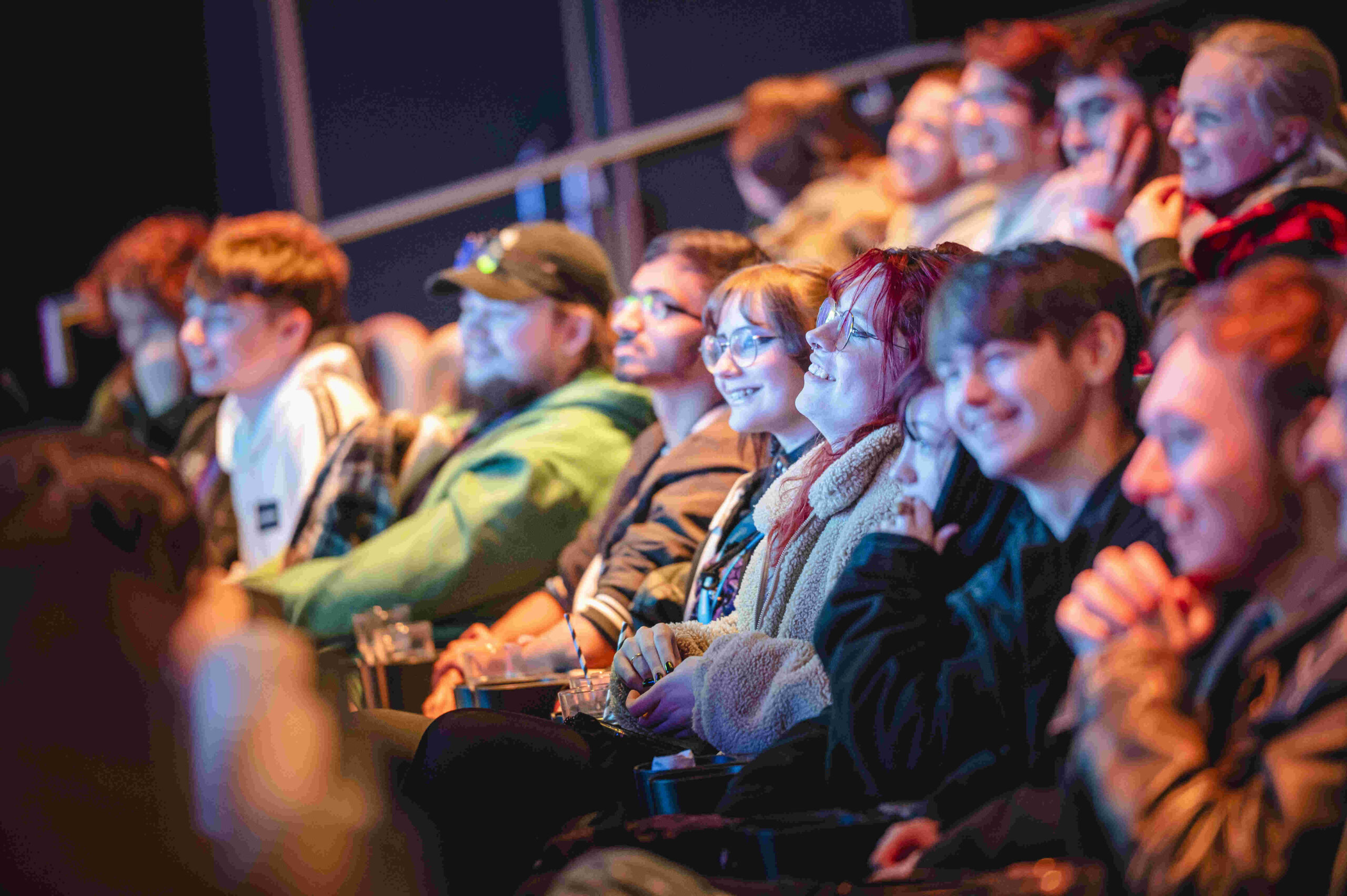Duration:
2 years full-time | Top-up available
Location:
Confetti Nottingham Campus, NTU
UCAS course code:
P311
Institution code:
N91
Quick! We have some places remaining for this September. Check out the entry requirements below.
This TV Production foundation degree embraces the ground breaking technology that continues to change our viewing habits and will equip you with the necessary technical skills required to work in the video production process whilst developing a strong portfolio of work.
If you want to be the next director, executive producer, documentary filmmaker or you want to produce a big budget online drama then this is the course for you. Some of our graduates have even gone on to work at ITV, Disney and Apple TV!
This course is for you if:
- you enjoy working on location and setting up equipment as part of a group
- you are good at organisation and planning
- you are excited by working on location on client work
Progression route
Top-up your degree to a full BSc (Hons) qualification in Television Production at NTU
Clearing 2024
- 48 UCAS points from up to three qualifications; and
- GCSE – English and Maths Grade C / 4
Spaces are limited, so call NTU’s Clearing hotline on 0115 848 6000 to secure your place.
2025 entry
- 64 UCAS Tariff points; and
- GCSE – English and Maths Grade C/4
To find out what qualifications have tariff points, please use our tariff calculator.
Other qualifications and experience
We may also consider credits achieved at other universities and your work/life experience through an assessment of prior learning. This may be for year one entry, or beyond the beginning of a course where applicable, for example, into year 2. Our Recognition of Prior Learning and Credit Transfer Policy outlines the process and options available for this route.
Meeting our entry requirements
Hundreds of qualifications in the UK have UCAS tariff points attached to specific grades, including A levels, BTECs, T Levels and many more. You can use your grades and points from up to four different qualifications to meet our criteria. Enter your predicted or achieved grades into our tariff calculator to find out how many points your qualifications are worth.
How to apply
This degree is validated by Nottingham Trent University. You can apply through UCAS.
Preparing for the financial side of student life is important, but there’s no need to feel anxious and confused about it. We hope that our fees and funding pages will answer all your questions.
Sound and Picture for Broadcast (20 Credit Points)
Understanding the capabilities and scientific principles of broadcast technologies is essential for working in the television industry. You’ll explore the technical theory involved in camera operation, audio acquisition and lighting whilst developing your technical and craft skills working with equipment to achieve a broadcast quality to your work.
Live Studio Production (20 Credit Points)
You’ll study the technology, principles, techniques and workflow required to produce content for broadcast in a studio environment and will gain valuable knowledge through experiencing a range of production roles within the broadcast studio environment to enhance your understanding of this career path. You’ll put this theory into practice, working to the correct health and safety regulations, in your own live production.
Live Studio Planning (20 Credit Points)
Pre-production is the starting point for any live studio production. Project planning skills are essential if you are to create successful content. During this module you will learn about the different stages of broadcast studio project management such as risk assessment, kit specifications, crewing, budgeting, working with scripts and scheduling. You will work in small groups to project manage the technical requirements of a broadcast studio production demonstrating a detailed understanding of the health and safety regulations that govern the television industry and in particular broadcast studio production.
Post-Production Technology for Television (20 Credit Points)
Explore the changes in television post-production workflow. Advances in television post-production technology have seen a shift from linear tape-based editing to digital editing. You’ll learn to operate the industry-standard audio and video post-production software used to create, manipulate, and distribute content for television in both offline and online environments.
The History of Broadcast Technology (20 Credit Points)
Learn to compare broadcast technologies past and present, developing your understanding of how history has shaped the way TV content is produced. You’ll assess the impact technology has had, and continues to have, on the changes in television production, distribution and viewing habits.
Interview Techniques for Broadcast (20 Credit Points)
Explore the creative and technical processes involved in shooting interviews for a range of television formats (news, documentary, entertainment etc.) During this module you will examine a variety of creative factors within different interview techniques.
On completion of the module you will be well versed in a variety of questioning and interview techniques and understanding of the technical set up required to create content to a broadcast standard.
Advanced Sound and Picture for Broadcast (20 Credit Points)
As digital consumption begins to dominate, the technical requirements for producing content for television have become even more complex. You’ll examine the engineering capabilities of specialist equipment and operate a range of equipment in order to shoot more complex sequences. You’ll learn to perform the role of the digital imaging technician; ensuring cameras are able to achieve their optimum performance in a given scenario.
Industry Practice (20 Credit Points)
Undertake appropriate self-directed projects, working collaboratively on creative work, allowing you to directly apply the knowledge and skills learnt throughout the programme in the context of the workplace. This module aims to develop your overall professionalism and provide you with the knowledge and resources to begin a career in the creative industries.
Advanced Post-Production Technology for TV (20 Credit Points)
Digital technology means there are more ways to watch, influence and interact with TV content. Content producers are increasingly synchronising television programmes with second-screen content to further enhance the viewing experience. You’ll learn to prepare and distribute audio-visual content via a variety of different platforms. You’ll develop advanced post-production skills such as grading, colour correction, audio dubbing and mixing, working with an industry partner to deliver an edit for multiple platforms.
Documentary Development (20 Credit Points)
Working under the guidance of an industry partner, you’ll undertake the pre-production of your own documentary, including researching relevant markets and film festivals to help inform its development. You’ll be expected to make appropriate judgments in the planning process and demonstrate the ability to problem-solve.
Documentary Production (20 Credit Points)
Apply the skills of both journalist and film-maker in the production of your own television documentary. You’ll focus on the important legal, ethical and regulatory frameworks that govern this genre to produce a documentary that meets broadcast standards.
Live Stream Production (20 Credit Points)
With live streaming becoming an important part of television broadcast, this module aims teach you the technology fundamentals and skills required to produce and deliver high-quality live streaming content. This module will cover variety of audio-visual hardware and the different live streaming services that are required to ensure a high-quality experience for audiences.
Within this module you will research and plan a live streaming event, once your event has been planned you will be required to lead a team of production staff in the live stream of broadcast content to an appropriate audience.
Do It For Real
Industry Week
Studying at Confetti you’ll take part in Industry Week where you’ll be able to meet a range of professionals within your field of interest as well as other areas of the creative industries.
Past guests include Shane Meadows, Vicky McClure and Stephen Graham.
Student work
Our Talent Development team works closely with course leaders to link students with opportunities across the industry. TV Production students have previously worked with and visited leading companies, such as:
- Notts TV
- WBBL
- Boots UK
- Flo Skatepark
On this course you’ll study in Confetti HQ – our £9.1million digital media hub. You’ll have access to:
- Black Magic and Sony Broadcast Cameras
- Autoscript
- Tricaster
- Blackmagic ATEM
- Wireless audio and visual equipment
- OBS
- A variety of different grip and audio equipment
You’ll also study in Space 2 which is kitted out with:
- A 37m2 green screen VFX studio with VFX infinity curve screen and latest OptiTrack technology
- A 144m2 television studio space with broadcast standard digital video cameras and full lighting rig
- A 25 seat screening room
- Broadcast specification production gallery with 4k production facilities
- A 25 seat media production lab running Avid and Adobe Creative Cloud
- An events production workshop space – Bleachers House
Courses
After finishing your foundation degree, you may decide to go straight into industry or top-up to a full honours degree.
If you achieve a Commendation or higher grade, you’ll be able to progress onto the Level 6 (Final Year) of the BA Content Creation course.
For those completing their foundation degree with a Pass, you’ll have the opportunity to progress onto Level 5 (Year Two) of the course.
What roles do our graduates go on to?
- Floor manager
- Studio manager
- Production assistant
- Cinematographer
NTU Employability support
Our support doesn’t end when you graduate. As a Confetti and NTU student you will be entitled to dedicated graduate employability support for up to three years after you complete your studies. You’ll have access to exclusive events, initiatives and work experience opportunities to support you in the early stages of your graduate career.







